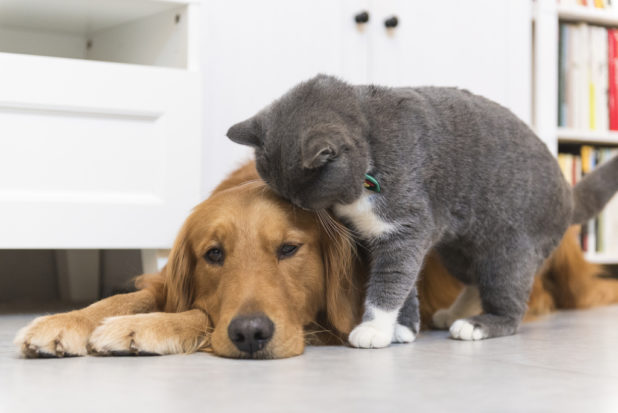
The U.S. Department of Agriculture reports that so far fewer than two dozen companion animals have tested positive, with no infections reported among birds, reptiles and fish. Photo by iStock.com
We received the sad news today that Buddy, the first dog in the United States known to have contracted the novel coronavirus, passed away on July 11. We share in the grief Buddy’s family is no doubt feeling over the loss of their beloved companion during what already is an extremely stressful time. A human family member had also tested positive for the virus and is believed to have passed it on to Buddy.
We are also mindful of the concerns of millions of pet owners who must be understandably worried, upon hearing this news, about keeping their pets and themselves safe during the pandemic. While there is still much to learn about the coronavirus, and its transmissibility between pets and people, experts believe that the risks are low.
It’s important to note that the National Geographic article that broke the news revealed that Buddy’s bloodwork showed he had lymphoma, a type of cancer. “It’s unclear whether cancer made him more susceptible to contracting the coronavirus, or if the virus made him ill, or if it was just a case of coincidental timing,” the article reported.
It is also important to remember that while there are now 17 million confirmed cases of the coronavirus in humans worldwide, including more than 4.5 million people in the United States, there are just a handful of documented instances of companion animals contracting the disease. The U.S. Department of Agriculture keeps track of those numbers and so far fewer than two dozen companion animals have tested positive, with no infections reported among birds, reptiles and fish.
In late April, the Centers for Disease Control and Prevention and the USDA announced the first confirmed cases of coronavirus infection in two pet cats in New York state. The cats had mild respiratory illness and were the first pets in the United States to test positive for the virus.
The first case of the virus in a companion animal worldwide was recorded in February, when a dog in Hong Kong tested positive, most likely after contracting the virus from his owner. The 17-year-old dog later tested negative for the virus but died in July from other existing health issues, authorities believe.
The CDC, USDA and the World Organization for Animal Health have issued advisories saying that at this time there is no evidence that animals play a significant role in spreading the virus that causes COVID-19. It also appears to be the case that the virus cannot sustain itself in pet fur for very long, so the CDC and the veterinary community have taken the position that there is no evidence that a person could contract the coronavirus by touching a pet.
That said, we are closely monitoring the evidence with both animal welfare and the human-animal bond in mind. With Buddy and his family in our thoughts, I’d like to share some tips developed by the Humane Society Veterinary Medical Association (HSVMA) for keeping yourself and your pets safe during the pandemic:
- If you are confirmed to have COVID-19 (or if you are symptomatic or believe you may have been exposed) you should avoid contact with other people as well as with pets, and you should also avoid sharing any food.
- Have a plan in place for someone to help care for your pet(s) in the event you get sick or are hospitalized.
- If you must provide care for your pet or be around other animals while you are sick, wear a cloth face covering and wash your hands before and after you interact with them.
- Do not let pets interact with people or other animals outside the household.
- Keep cats indoors whenever possible to prevent them from interacting with other animals or people.
- Walk dogs on a leash, maintaining at least six feet (two meters) from other people and animals.
- Avoid dog parks or public places in which large number of people and dogs gather.
- Talk to your veterinarian if your pet gets sick or if you have any concerns about your pet’s health.
Dr. Gail Hansen of HSVMA says it is critically important that pet owners keep matters in perspective and not make rash decisions concerning their pets. “All of the known cases in pets were in households with a person infected with COVID-19. The key point is that pets should be treated the same as any other family member,” she adds.
That’s our view too. The welfare of companion animals in the midst of this pandemic is inextricably connected to our own. We’ll continue to deliver the message that people should exercise the greatest caution with their pets, and avoid unnecessary risks, while also reinforcing the widely shared sentiment that they depend upon our mercy and care, now more than ever.
The post Risk of coronavirus among pets remains low, health officials say appeared first on A Humane World.
Enviroshop is maintained by dedicated NetSys Interactive Inc. owners & employees who generously contribute their time to maintenance & editing, web design, custom programming, & website hosting for Enviroshop.
